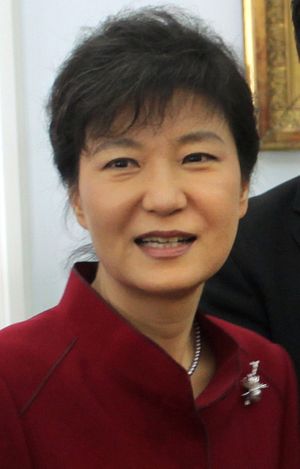On Monday, South Korean President Park Geun-hye stated that she would disband the Republic of Korea Coast Guard in response to the Coast Guard’s perceived failure in effectively handling the April 16 sinking of the Sewol ferry. Sewol’s sinking resulted in the death and disappearance of over 300 people, mostly high school students. Park vowed to disband the Coast Guard, stating that South Korea needed “reform and a great transformation” after the Sewol tragedy.
Park made the declaration in a teary-eyed nationally televised speech. She bowed, offering the nation a “heartfelt apology” and accepted responsibility for the disaster: “The ultimate responsibility lies with me, the president,” she said. In the month since the crisis, Park had been quick to assume responsibility and had apologized several times; Monday’s televised announcement was her most public apology yet. “We failed to save those students who should have been saved,” Park added. “I will make this an opportunity for South Korea to be born again.”
As of yet, there are few details about the mechanics of disbanding the Coast Guard but its responsibilities will be subsumed by the national police. According to Park, the Coast Guard “didn’t do its duty … If it had tried to rescue people more swiftly and more actively right after the accident, it could have greatly reduced the casualties.” According to the New York Times, when the Coast Guard arrived on the scene of the accident, they first rescued the ferry’s crew, including the ship’s captain, who was one of the first people to abandon the sinking boat. By doing this, the Coast Guard delayed its response to the hundreds trapped within the hull of the ship and in the waters around the ferry.
“The sinking of the Sewol will stay as a hard-to-erase scar in our history,” Park noted in her televised speech. “It’s the duty of the living to make reform and a great transformation for the country so that the sacrifices of the dead were not wasted. If we cannot reform ourselves in a situation like this, we will become a nation that will never be able to achieve reform.”
Park additionally condemned South Korea’s bureaucratic culture, including a deeply entrenched acceptance of poor regulatory standards and enforcement that have led to the nation becoming complacent about safety standards and disaster relief protocol. The Times reports: “Investigators of the ferry sinking say that corrupt culture contributed to the disaster. The ferry was overloaded with cargo that was poorly secured, and yet it was ruled safe to sail by the Korean Shipping Association, a lobby for the industry that was also in charge of inspecting the safety of ships. Central government officials were accused of failing to supervise the association, where their former colleagues and bosses found high-ranking jobs.”
Park signaled that she would attempt to turn the reforms she announced on Monday into reality as soon as possible. She will send bills with the proposed changes to the National Assembly and, for the moment, public support seems to be on her side as South Koreans grow hungry for reform following the Sewol tragedy.

































